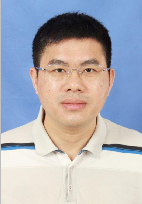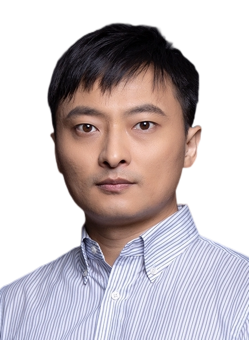

Prof. Wenjian Luo
Harbin Institute of Technology, Shenzhen
BIO: Wenjian Luo is presently a professor of School of Computer Science and Technology, Harbin Institute of Technology,Shenzhen, China. He received the BS and PhD degrees from Department of Computer Science and Technology, University of Science and Technology of China, Hefei, China, in 1998 and 2003, respectively. His research interests mainly focus on the secure intelligent systems, including artificial intelligence security, data privacy, big data analysis, dynamic and multi-objective optimization. He has published more than 100 international journal and conference papers. He is a distinguished member of CCF and a senior member of IEEE, ACM and CAAI. He currently serves as an area editor Applied Soft Computing Journal, and an associate editor (or editorial board member) for several journals including Information Sciences Journal, Swarm and Evolutionary Computation Journal, Journal of Information Security and Applications, and Complex & Intelligent Systems Journal. He was the chair of the IEEE CIS ECTC Task Force on Artificial Immune Systems from 2018-2022. He has been a member of the organizational team of more than twenty academic conferences, in various functions, such as general chair, program chair, symposium chair, tutorial chair and publicity chair.
The speech title: Multilabel Adversarial Examples and Defense Methods
Abstract:With the fast development and applications of artificial intelligence techniques, especially deep learning models, the security issues of artificial intelligence have been an important research topic. The adversarial example is one kind of nonnegligible security threats for deep learning models. Multilabel adversarial examples for multilabel classification models based on deep learning have attracted attention in recent years. This talk will introduce multilabel adversarial examples generation and defense methods. First, this talk will start with the general concepts of adversarial example, and the attack types of multilabel adversarial examples. Second, this talk will present the generation algorithms of multilabel adversarial examples under white-box and black-box environments. Third, some typical defense techniques will be introduced. Finally, this talk will briefly discuss the future trend of artificial intelligence security.

Prof. Huawei Huang
Sun Yat-sen University, China
BIO: Huawei Huang is a Professor at Sun Yat-sen University, a recipient of the Guangdong Provincial Outstanding Youth Science Fund, and a dual-appointment professor at the Hong Kong Advanced Research Institute (HKARI) of SYSU, and at Lingnan College of SYSU. Since 2023, he has been consecutively recognized among the Top 2% Scientists Worldwide by Stanford University. He is an IEEE Senior Member and a Senior Member of the China Computer Federation (CCF). His research interests span high-performance blockchain systems and protocols, blockchain finance, DeFi protocols, and Web3 infrastructure and protocols. He has published numerous research findings in CCF-A journals and conferences such as IEEE/ACM ToN, JSAC, TPDS, TSC, TDSC, TIFS, TMC, TC, and INFOCOM. He has served as chair for many international and domestic academic conferences, workshops, and symposiums. He is the author of two English-language blockchain monographs “From Blockchain to Web3 & Metaverse” and “Blockchain Scalability,” as well as a popular science book on blockchain, namely “From Blockchain to Web3: building the next-generation Internet”. Under his leadership, his team developed and open-sourced a blockchain experimental tool named BlockEmulator, which provides researchers with mature, high-quality experimental framework and code. BlockEmulator has served researchers ranging from over 80 countries and regions worldwide.
The speech title:BrokerChain Testnet: How we design and What we have learned
Abstract:BrokerChain, a high-performance blockchain sharding protocol proposed by Prof. Huawei Huang's research group in 2022, addresses core challenges in blockchain scalability, cross-shard transaction efficiency, and decentralized application (dApp) ecosystem. In June 2025,his team implemented it as an academic testnet, introducing a dynamic account-partitioning-based state sharding mechanism, broker account-assisted cross-shard transaction method, and a PBFT-integrated intra-shard consensus. This testnet provides a research and development platform for academia and industry, supporting experiments in DeFi protocols, NFT fragmentizationfor multi-holder trading, andreal-worldassets (RWA) tokenization. Its core features include EVM compatibility, low gas fee consumption, high-efficiency intra-shard consensus, and user-friendly wallet software, significantly lowering barriers for developers and end-users.
Thistalk delves into BrokerChain Testnet’s architectural design, technological innovations, and real-worldrunning in the past two months.Through dual validation via technological innovation and ecosystem practice, BrokerChain testnet offers a comprehensive paradigm for the blockchain sharding. Its dynamic load-balancing algorithm, hierarchical consensus model, and economic incentive mechanisms provide critical insights for Web3.0 infrastructure development. Looking ahead, BrokerChain is promised to become a benchmark solution for next-generation highly scalable blockchains.

Prof.Thippa Reddy Gadekallu
IEEE Senior Member
Zhongda Group, China
BIO: Thippa Reddy Gadekallu (Senior Member, IEEE) received the bachelor’s degree in computer science and engineering from Nagarjuna University, India, in 2003, the master’s degree in computer science and engineering from Anna University, Chennai, Tamil Nadu, India, in 2011, and the Ph.D. degree from Vellore Institute of Technology, Vellore, Tamil Nadu, in 2017. He is currently with the Division of Research and Development, Lovely Professional University, Phagwara, India, the Department of Electrical and Computer Engineering, Lebanese American University, Byblos, Lebanon, and the Center of Research Impact and Outcome, Chitkara University, Punjab, India. He has more than 14 years of experience in teaching. He has more than 150 international/national publications in reputed journals and conferences. His research interests include machine learning, the Internet of Things, deep neural networks, blockchain, and computer vision. He is an editor of several publishers, such as Springer, Hindawi, Plosone, Scientific Reports (Nature), and Wiley. He also acted as a guest editor in several reputed publishers, such as IEEE, Elsevier, Springer, Hindawi, and MDPI. He was recently recognized as one among the top 2% scientists in the world as per the survey conducted by Elsevier, in 2021.

Prof. Haiquan Zhao
IEEE Senior Member
Southwest Jiaotong University, China
BIO: Zhao Haiquan, PhD in Engineering, Professor, Senior Member of IEEE and the Chinese Institute of Electronics, Elsevier Highly Cited Scholar, Global Top 0.05% Scholar (ScholarGPS), Global Top 2% Scientist (Stanford), Academic and Technical Leader of Sichuan Province, Outstanding Expert with Outstanding Contributions in Sichuan Province, Winner of the Sichuan Province Outstanding Youth Fund, Distinguished Expert of the Haizhi Program of the Sichuan Association for Science and Technology, has published 280 SCI papers, received the First Prize of Natural Science from the Chinese Society of Automation, and six provincial and ministerial awards including the Second Prize for Science and Technology Progress from the Ministry of Education, the China Railway Science and Technology Progress Award, and the Tang Lixin Outstanding Scholar Award. He serves on the editorial boards of several international SCI journals including IEEE TASLP, IEEE TSMCA, IEEE SPL, and Signal Processing, among others. His main research areas are signal processing, pattern recognition, and artificial intelligence.